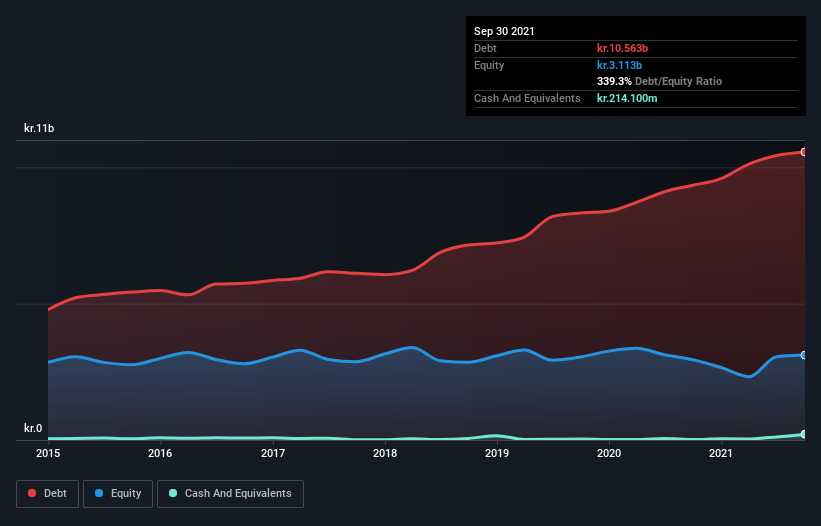
Some say volatility, rather than debt, is the best way to think about risk as an investor, but Warren Buffett famously said that 'Volatility is far from synonymous with risk.' When we think about how risky a company is, we always like to look at its use of debt, since debt overload can lead to ruin. We note that Københavns Lufthavne A/S (CPH:KBHL) does have debt on its balance sheet. But should shareholders be worried about its use of debt?
Why Does Debt Bring Risk?
Debt and other liabilities become risky for a business when it cannot easily fulfill those obligations, either with free cash flow or by raising capital at an attractive price. In the worst case scenario, a company can go bankrupt if it cannot pay its creditors. However, a more frequent (but still costly) occurrence is where a company must issue shares at bargain-basement prices, permanently diluting shareholders, just to shore up its balance sheet. Of course, debt can be an important tool in businesses, particularly capital heavy businesses. When we examine debt levels, we first consider both cash and debt levels, together.
View our latest analysis for Københavns Lufthavne
What Is Københavns Lufthavne's Debt?
The image below, which you can click on for greater detail, shows that at September 2021 Københavns Lufthavne had debt of kr.10.6b, up from kr.9.34b in one year. However, it also had kr.214.1m in cash, and so its net debt is kr.10.3b.

How Healthy Is Københavns Lufthavne's Balance Sheet?
According to the last reported balance sheet, Københavns Lufthavne had liabilities of kr.1.04b due within 12 months, and liabilities of kr.11.2b due beyond 12 months. On the other hand, it had cash of kr.214.1m and kr.350.8m worth of receivables due within a year. So its liabilities total kr.11.7b more than the combination of its cash and short-term receivables.
This deficit isn't so bad because Københavns Lufthavne is worth kr.44.6b, and thus could probably raise enough capital to shore up its balance sheet, if the need arose. But it's clear that we should definitely closely examine whether it can manage its debt without dilution. When analysing debt levels, the balance sheet is the obvious place to start. But it is Københavns Lufthavne's earnings that will influence how the balance sheet holds up in the future. So if you're keen to discover more about its earnings, it might be worth checking out this graph of its long term earnings trend.
Over 12 months, Københavns Lufthavne made a loss at the EBIT level, and saw its revenue drop to kr.1.3b, which is a fall of 44%. That makes us nervous, to say the least.
Caveat Emptor
Not only did Københavns Lufthavne's revenue slip over the last twelve months, but it also produced negative earnings before interest and tax (EBIT). Indeed, it lost kr.1.3b at the EBIT level. Considering that alongside the liabilities mentioned above does not give us much confidence that company should be using so much debt. So we think its balance sheet is a little strained, though not beyond repair. However, it doesn't help that it burned through kr.978m of cash over the last year. So to be blunt we think it is risky. The balance sheet is clearly the area to focus on when you are analysing debt. However, not all investment risk resides within the balance sheet - far from it. For example, we've discovered 2 warning signs for Københavns Lufthavne that you should be aware of before investing here.
Of course, if you're the type of investor who prefers buying stocks without the burden of debt, then don't hesitate to discover our exclusive list of net cash growth stocks, today.
Valuation is complex, but we're here to simplify it.
Discover if Københavns Lufthavne might be undervalued or overvalued with our detailed analysis, featuring fair value estimates, potential risks, dividends, insider trades, and its financial condition.
Access Free AnalysisHave feedback on this article? Concerned about the content? Get in touch with us directly. Alternatively, email editorial-team (at) simplywallst.com.
This article by Simply Wall St is general in nature. We provide commentary based on historical data and analyst forecasts only using an unbiased methodology and our articles are not intended to be financial advice. It does not constitute a recommendation to buy or sell any stock, and does not take account of your objectives, or your financial situation. We aim to bring you long-term focused analysis driven by fundamental data. Note that our analysis may not factor in the latest price-sensitive company announcements or qualitative material. Simply Wall St has no position in any stocks mentioned.
About CPSE:KBHL
Københavns Lufthavne
Owns, develops, and operates Copenhagen Airport and Roskilde Airport in Denmark.
Solid track record with imperfect balance sheet.

